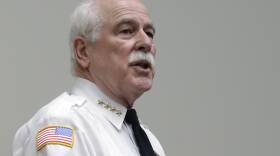EXPLORE MORE
Coming up on BPR, Thursday, January 2, 2025:
NBC's Chuck Todd
Former Sec. of Public Safety Andrea Cabral
Boston Globe business columnist Shirley Leung
Food policy analyst Corby Kummer
Recent segments
-
Carol Rose: An Independent Investigation Is Needed In Bristol County Jail Incident
"We're hoping they make the surveillance tapes available," says executive director of ACLU of Massachusetts. -
Andrew Yang On Why The Stimulus Checks Aren't Enough
The presidential candidate who ran on the promise of a universal basic income is calling for recurring checks during the coronavirus pandemic. -
'Social Distancing Is Impossible' In Meat Packing Plants, Says Corby Kummer
Working conditions within meat packing plants require close quarters to colleagues, says Kummer. -
Charlie Sennott: ‘It’s Time to Fight Like Hell’ To Protect Press Freedom
The WGBH news analyst weighed in on the myriad of factors threatening journalism both in the U.S. and around the world. -
Travel Writer Rick Steves, Grounded By The Coronavirus, Says 'There's More To Life Than Being Productive'
Steves is stuck at home for now, but is keeping his company going so they can jump right back in when pandemic passes. -
'Never Have I Ever' Show Is 'Perfect' For Uncertain Times, Says Bob Thompson
The charming new Netflix show is a comforting during the pandemic, Thompson says.
Listen to previous shows
-

BPR Full Show: Substitute horror stories
Today on Boston Public Radio: Superintendent Brenda Cassellius answers questions from listeners about the state of schools, including the teacher shortage and wait lists for Boston’s exam schools. Cassellius is the superintendent of Boston Public Schools. Then, we ask listeners about the Omicron variant and how the pandemic is playing out in schools, including hearing from Massachusetts Teachers Association President Merrie Najimy. Makinde Ogunnaike and Josh Sariñana talk about how they turn physics and neuroscience into art and poetry, and the intersection of physics and religious faith. Ogunnaike is a PhD candidate in physics at MIT, where he researches quantum systems and the new states of matter they can create. He also runs the Harvard-MIT chapter of the National Society of Black Physicists. Sariñana is a fine art photographer, a writer and neuroscience marketing professional. He’s also the director of “The Poetry of Science.” Corby Kummer weighs in on who has intellectual property claims to a recipe, and where restaurants stand with restrictions and masking. Kummer is the executive director of the Food and Society policy program at the Aspen Institute, a senior editor at The Atlantic and a senior lecturer at the Tufts Friedman School of Nutrition Science and Policy. Andy Ihnatko discusses the latest developments in electric car technology, and Jack Dorsey’s decision to step away as CEO of Twitter. Ihnatko is a tech writer and blogger, posting at Ihnatko.com. Sue O’Connell updates listeners on the latest news in the Cuomo family scandal, after Chris Cuomo was suspended indefinitely from CNN. She also talks about the success of Amy Schneider, the first trans person to make “Jeopardy!” Tournament of Champions. O’Connell is the co-publisher of Bay Windows and the South End News, as well as NECN's political commentator and explainer-in-chief. We end the show by talking with listeners about how they treated substitute teachers back in the day, amid a teacher shortage and dire need for substitutes. -

BPR Full Show: The Art of Giving
Today on Boston Public Radio: Chuck Todd weighs in on yesterday’s Supreme Court deliberations over abortion and the status of Build Back Better. Todd is the moderator of “Meet the Press,” host of “Meet the Press Daily” on MSNBC and the political director for NBC News. Then, we ask listeners their thoughts on the Supreme Court arguments over abortion yesterday. Andrea Cabral continues the conversation about the Supreme Court’s stance on abortion, and the school shooting in Michigan and prosecutors’ hopes to charge the shooter’s parents for their son gaining access to the gun. Cabral is the former Suffolk County sheriff and the former Massachusetts secretary of public safety. She is currently the CEO of the cannabis company Ascend. Paul Reville talks about how the shortage of teachers is affecting substitute teachers, and how schools can work to combat the teacher shortage. Reville is the former Massachusetts secretary of education and a professor at Harvard University’s Graduate School of Education, where he also heads the Education Redesign Lab. His latest book, co-authored with Lynne Sacks, is “Collaborative Action for Equity and Opportunity: A Practical Guide for School and Community Leaders.” Ryan Landry previews his theater company’s Christmas show this year, “A Grinchley Christmas.” Landry is a playwright, lyricist, actor and founder of the Gold Dust Orphans theatrical company. His new album is “The Vamps.” Jon Gruber talks about the economics of why people give, following Giving Tuesday this week. Gruber was instrumental in creating both the Massachusetts healthcare reform and the Affordable Care Act, and his latest book is “Jump-Starting America: How Breakthrough Science Can Revive Economic Growth And The American Dream.” We end the show by asking listeners about their giving habits. -

BPR Full Show: Gov. Charlie Baker's decision not to seek reelection, SCOTUS and abortion, and more
Today on Boston Public Radio: We open the show by asking listeners for their thoughts on Gov. Charlie Baker’s announcement that he would not be seeking reelection. Dr. Cheryl Hamlin talks about her experience working at the last abortion clinic in Mississippi, which is central to the Supreme Court case that could overturn Roe v. Wade. Dr. Hamlin is an obstetrician and gynecologist at Mount Auburn Hospital in Cambridge, and she called into us from Jackson, Mississippi, where she’s on rotation at the last operating abortion clinic in the state. Art Caplan shares the latest news surrounding the Omicron COVID-19 variant, and weighs in on Dr. Mehmet Oz’s entrance into the Pennsylvania Senate race. Caplan is director of the Division of Medical Ethics at the New York University School of Medicine. Juliette Kayyem discusses the shooting at Oxford High School in Michigan, and shares how smaller stores across the U.S. are hoarding products due to supply chain issues ahead of holiday shopping. Kayyem is an analyst for CNN, former assistant secretary at the Department of Homeland Security and faculty chair of the homeland security program at Harvard University’s Kennedy School of Government. Jim Aloisi and Stacy Thompson talk about Gov. Charlie Baker’s decision to pull Massachusetts out of a multi-state compact aimed at reducing carbon emissions in the transportation sector. They also touch on Mayor Michelle Wu’s climate change and transit agenda. Aloisi is the former Massachusetts transportation secretary, a member of the Transit Matters board, and contributor to Commonwealth Magazine. Thompson is executive director of Livable Streets. Dr. Virginia Sinnott-Stutzman joins us for another edition of “Ask the Vet,” answering listeners’ questions and concerns about their pets. Sinnott-Stutzman is a senior staff veterinarian at Angell Animal Medical Center. We end the show by returning to our conversation with listeners on Gov. Baker’s decision not to seek reelection. -

BPR Full Show: Senator Ed Markey Pushes Build Back Better
Today on Boston Public Radio: We begin the show by asking listeners whether they have picked up new health habits during the pandemic. Trenni Kusnierek talks about the potential impact of the Omicron variant on the Winter Olympics in Beijing, and Turkish Boston Celtics player Enes Kanter Freedom celebrating his new U.S. citizenship by changing his last name to Freedom. Kusnierek is an anchor and reporter for NBC Sports Boston, as well as a Boston Public Radio contributor. Shirley Leung discusses the ramifications of the state legislature failing to allocate billions of American Rescue Plan Act funding before going on recess. Leung is a business columnist for The Boston Globe and a Boston Public Radio contributor. Senator Ed Markey shares his work with senate democrats to reach consensus on the social infrastructure package, and emphasizes the need for filibuster reform to pass voting rights legislation. Markey is a senator of Massachusetts. Then, we ask listeners their thoughts on the Build Back Better plan. Christopher Kimball previews his latest cookbook “Vegetables,” sharing his favorite ways to bring vegetables to the center of the plate. Chris Kimball co-founded America’s Test Kitchen, and now runs Christopher Kimball’s Milk Street in Boston. His latest cookbook is “Vegetables.” John King weighs in on the latest political headlines, including the status of the Build Back Better plan, why he thinks rapid tests are not more accessible and the power of extreme Republicans like Rep. Marjorie Taylor Greene. King is CNN’s chief national correspondent and anchor of “Inside Politics,” which airs weekdays at noon and Sundays at 8 a.m. We end the show by continuing our conversation with listeners about Build Back Better. -

BPR Full Show: Gov. Baker on testing, vaccine cards and ARPA funding
Today on Boston Public Radio: We begin the show by asking listeners about how they are reacting to the latest news about the Omicron variant. Michelle Singletary gives tips on how to budget for the holiday and avoid scams during the shopping season. Singletary is a nationally syndicated columnist for The Washington Post, whose award-winning column "The Color of Money" provides insight into the world of personal finance. Christopher Muther talks about the latest locations of Getaway House, a Cambridge-based startup of tiny homes offered for vacation rental, and weighs in on ABBA’s latest album in 40 years, Voyage. Muther is a Boston Globe travel columnist and travel writer. Gov. Charlie Baker discusses why testing is not more widely available across the state, his efforts to create a single QR code showing proof of vaccination and his dissatisfaction with the state legislature’s delay in spending the American Rescue Plan Act money. Baker is the governor of Massachusetts. Revs. Irene Monroe and Emmett G. Price III react to the conviction of Ahmaud Arbery’s murderers last week. Monroe is a syndicated religion columnist, the Boston voice for Detour’s African American Heritage Trail and co-host of the All Rev’d Up podcast. Price is the founding pastor of Community of Love Christian Fellowship in Allston, the inaugural dean of Africana studies at Berklee College of Music and co-host of the All Rev’d Up podcast. Keith Lockhart mourns the loss of composing giant Stephen Sondheim, who died on Friday. He also previews Boston Symphony Orchestra’s Holiday Pops performance. Keith Lockhart is conductor for the Boston Symphony Orchestra, and will be leading the Boston Holiday Pops this season, which starts Dec. 2 and runs through Christmas eve. Anne Barrett Doyle shares memories of Phil Saviano, a survivor of clergy sexual abuse who played a large role in bringing the story to the public, who died on Sunday. Doyle is the co-director of BishopAccountability.org, an online library tracking global clergy sexual abuse in the Catholic Church.









